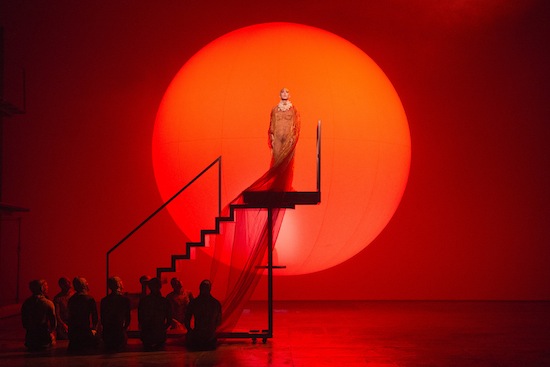Photo © Richard Hubert Smith
Philip Glass is a living composer who can be parodied on Southpark, whose music is included on documentary soundtracks as if by reflex action. The familiarity of his name makes it easy to forget how inscrutable and weird his music can be. This brand new production of Akhnaten (it was first staged in 1984) emphasises its strangeness and in doing so highlights the challenging kind of work that contemporary opera audiences are keen to see.
Akhnaten was the third of Glasses’ ‘portrait’ operas, following Einstein On The Beach (1975) and Satyagraha (1979), which respectively used Einstein and Gandhi as totemic figures: signifiers of revolutionary thought. Akhnaten (more commonly transliterated as ‘Akhenaten’) was an eighteenth dynasty Egyptian pharaoh (c. 1350 BC) primarily known for being an early advocate of a monotheistic religion, discredited in the period immediately following his death.
As in the previous two works, Glass doesn’t feel remotely compelled to communicate his story with any lucidity. It is sung primarily in Ancient Egyptian without subtitles, unfolding in long tableaux with the dramatic pace of a darkening twilight sky. For example, in the first act ‘coronation’ scene, a naked Akhnaten slowly descends a staircase and is dressed in a golden robe – this takes a full twenty minutes. Later on, he sings a love duet with Queen Nefertiti – it takes them ten minutes to do nothing other than walk from either side of the stage, loop their sheer red robes around each other and exit again. Everything is ritualised, close to stasis.
This might sound maddening in description, but the effect of Glass’ looping, incrementally developing music is hypnotic: our breathing starts to match its pacing. The impression is that of witnessing a painting coming to life, enhanced by Phelim McDermott’s striking visuals. McDermott (director of the Improbable theatre company) previously achieved a critical and popular hit with his intensely creative version of Satyagraha (also staged at ENO in 2007 and 2013), with its walls of sellotape and towering papier maché puppets. His recurring image in Akhnaten is the orb, the Ancient Egyptian metaphor for celestial bodies and, by association, deities. During an exquisite scene featuring Akhanten‘s hymn to the god Aten, a single, gigantic orb fills the stage, lit in shifting hues, but elsewhere teams of jugglers represent the motions of the stars and planets. It comes as a surprise, but apparently the Ancient Egyptians were big fans of juggling and here that skill becomes a neat parallel to the music, simultaneously still and in motion, repetitive and beguiling.
The real Akh(e)naten, during his lifetime, commissioned a number of curiously androgynous portraits, something Glass references by choosing the uncanny falsetto/counter-tenor voice for the title role. McDermott underlines this, with his illusions of breasts and female genitals in Akhnaten‘s costumes. (As a digression, Derek Jarman completed – but never filmed – a screenplay of the Akhnaten story, in which he had hoped to cast a more contemporary androgyne, David Bowie).
What this amounts to is something that is genuinely timeless, bold and unearthly. It’s an uncompromising piece but, noticeably, people have flocked to see it, with near-to-full houses in the cavernous Coliseum Theatre. ENO is an opera company in dire straits, financially and managerially (it was hit-or-miss whether the ENO chorus would be on strike during the first act, as threatened), but the artistic risk-taking pays off.
I’d like to suggest that the big UK opera companies might consider staging a great deal more contemporary music of this scale and shift their focus away from the standard repertoire. New opera commissions tend to be ‘chamber music’ in scale, or produced outside the major spaces by enterprising companies such as ERRATICA, Tête à Tête, or Grimeborn. When a big wad of public money goes towards a modern work, the results are often spectacular – Birmingham Opera Company’s 2012 staging of Stockhausen’s gargantuan Mittwoch is a fine example. The public are ready for the challenge – it attracts a more diverse and engaged audience. Akhnaten is a singular experience and a testament to the imagination of everyone involved. I’ve got my fingers crossed for more weirdness soon.


